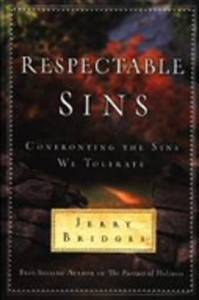An Acquiescence in the Lord’s Will
Jerry Bridges in his book, Respectable Sins (NavPress 2007), addresses the topic of “Anxiety and Frustration”[1][ch. 8]. In it he quotes John Newton, who writes a letter to his friend, saying:

[One of the marks of Christian maturity which a believer should seek is] an acquiescence in the Lord’s will founded in a persuasion of his wisdom, holiness, sovereignty, and goodness.… So far as we attain to this, we are secure from disappointment. Our own limited views, and short-sighted purposes and desires, may be, and will be, often over-ruled; but then our main and leading desire, that the will of the Lord may be done, must be accomplished. How highly does it become us, both as creatures and as sinners, to submit to the appointments of our Maker! and how necessary is it to our peace! This great attainment is too often unthought of, and over-looked; we are prone to fix our attention upon the second causes and immediate instruments of events; forgetting that whatever befalls us is according to his purpose, and therefore must be right and seasonable in itself, and shall in the issue be productive of good. From hence arise impatience, resentment, and secret repinings [i.e., complainings], which are not only sinful, but tormenting; whereas, if all things are in his hand, if the very hairs of our head are numbered; if every event, great and small, is under the direction of his providence and purpose; and if he has a wise, holy, and gracious end in view, to which everything that happens is subordinate and subservient;—then we have nothing to do, but with patience and humility to follow as he leads, and cheerfully to expect a happy issue.… How happy are they who can resign all to him, see his hand in every dispensation, and believe that he chooses better for them than they possibly could for themselves![2]
If I know God to be “the only wise God” (Rom 16:27), then why don’t I trust him? If I know Him to be “the blessed and only Sovereign, the King of kings and Lord of lords,” (1 Tim 6:15) then why don’t I lean on His providence in my life?
Surely I am limited and short-sighted. Is it not the Lord who said, “My thoughts are not your thoughts, Nor are your ways My ways” in Isaiah 55:8.
I must yield myself to this all-knowing, all-powerful, all-mighty-over-all-sovereign God. I have no clue “about tomorrow.” I know that “tomorrow will care for itself” (Matt 6:34) yet I struggle in my flesh to bring all things under “the direction of his providence and purpose.” Therefore I resolve to pray and ask God to grant me faith to believe that His providential will for me in difficult circumstances (as well the “good” circumstances) comes to me in His infinite wisdom and goodness. Therefore I rely upon God and not on me. Therefore I acquiesce to His Will for my life.
